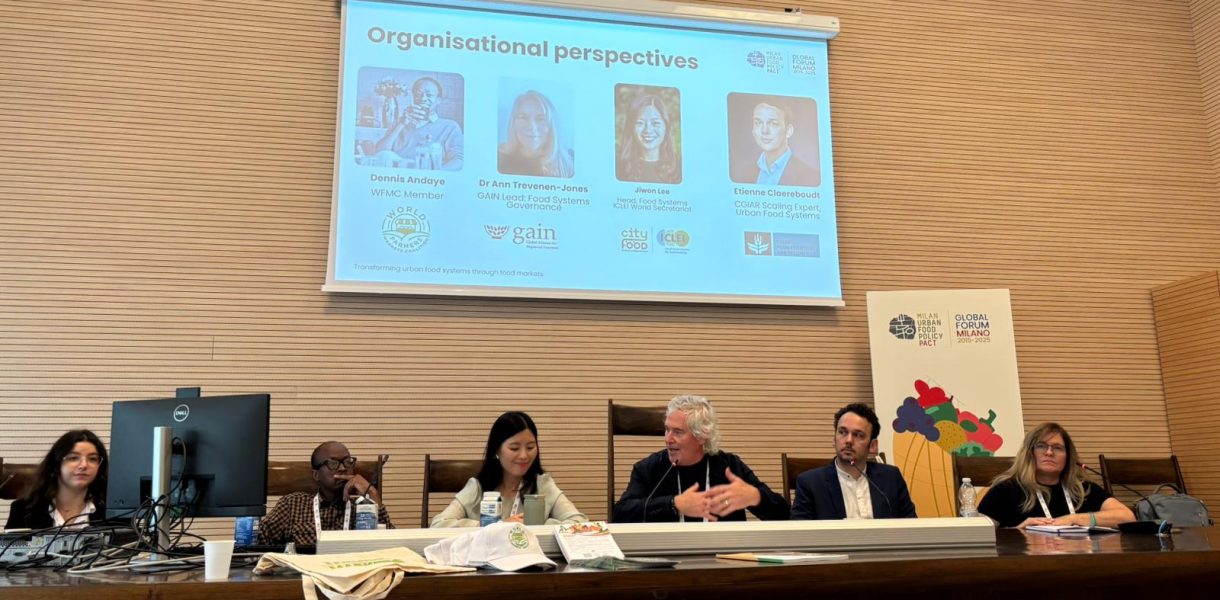Wednesday, October 15, 2025, the World Farmers Markets Coalition (WorldFMC) took the stage at the Milan Urban Food Policy Pact Global Forum 2025 to highlight the essential role of farmers markets in driving just, local, and sustainable food systems transformation.
The session on “Transforming Urban Food Systems through Food Markets” opened with remarks by WorldFMC President Richard McCarthy, followed by inspiring interventions from Dennis Andaye (WorldFMC / Nairobi Farmers Market) and Yurani Andrea Lopez Colmenares (WorldFMC – Bogotá), who brought the voices of producers and communities from Africa and the Andean region to the international stage.
Richard McCarthy also announced the signing of a Memorandum of Understanding with the President of the Milan Urban Food Policy Pact to strengthen collaboration and promote farmers markets across their networks and in the international context. This marks an important step in advancing farmers markets as a key entry point for cities committed to sustainable and inclusive food systems.
Farmers Markets as Levers for Just Food Systems
The session focused on the pivotal role of local and traditional farmers markets as entry points for locally led food systems transformation, offering multiple socio-economic and environmental levers for change. Farmers markets are unique spaces that connect urban consumers directly with local producers through short supply chains, creating vibrant community economies and ensuring access to fresh, healthy, and local food.
Today, much of the food we eat travels long distances through industrialized and global supply chains dominated by major corporate actors. This model often disenfranchises producers, MSMEs, wholesalers, and fresh food retailers, both formal and informal, while limiting consumers’ access to diverse and nutritious food.
In contrast, cities around the world are increasingly recognizing the power of municipal and farmers markets to nourish communities, including those most vulnerable to food insecurity and malnutrition. These markets also support livelihoods, local economic development, social protection, and fair revenue to smallholder, indigenous, and family farmers and vendors, while promoting sustainable food systems.
The conversation also built on key insights from the CityFood Market Handbook for Healthy and Resilient Cities, highlighting how municipal and farmers markets can ensure fair income for farmers, preserve biodiversity, and strengthen community resilience.
A Universal Definition for Farmers Markets
During the session, Richard McCarthy stressed the need for a clear and universal definition of farmers markets to ensure strong positioning in policy discussions at municipal, national, and international levels:
“At the World Farmers Markets Coalition, we think it is extremely important that we develop a very clear definition of what is a farmers market. This matters when we are negotiating with policy leaders, with municipalities, with national governments, and with international organizations. Because if it is vague, then the outcomes will also be vague. And we are very clear. We want farmers markets to be mechanisms for farmers to earn a dignified living, consumers to gain direct access to fresh, healthy food, and for cities to have safe public spaces. This only happens if it’s through a farmers market with direct contact. This is why we have developed a farmers market definition. We want to share it with you. We want it to go universal.”
The World Farmers Markets Coalition, the largest network of farmers markets in the world, recommends the following definition: A farmers market is a recurring and organized gathering where local farmers or their staff sell their fresh, locally grown and processed agricultural products directly to the consuming public. These markets provide vibrant spaces for communities to connect with their food sources, foster relationships between consumers and farmers, while supporting local economies and sustainable practices.
Voices from the Ground
Dennis Andaye:
“Farmers markets are a means of giving dignity to farmers, who are often segregated at the lowest levels of the social ladder. Thanks to the farmers market in Nairobi, many farmers have found their own social dimension that recognizes their role in ensuring that all consumers have access to high-quality food as well as a fair income.
As members of WorldFMC, we join the call for a definition of farmers markets that highlights their characteristics and differentiates them from other types of markets. Only in this way can we build resilient economic realities for the benefit of consumers, farmers, and communities.”
Yurani Andrea Lopez Colmenares:
ES: “Los mercados de productores no son solo lugares donde se compra comida. Son lugares de comunidad donde las personas, las familias, se reúnen para construir realidades sociales dentro de las ciudades, basadas en la confianza y el respeto. Por esta razón el apoyo de las entidades de gobierno debe facilitar marcos normativos favorables para fortalecerlos y promoverlos.”
EN: “Farmers markets are not just places where food is bought. They are community spaces where people and families come together to build social realities within cities, based on trust and respect. For this reason, support from government entities should provide favorable regulatory frameworks to strengthen and promote them.”
Reinforcing Global Commitment
Through this strong presence at the Milan Urban Food Policy Pact Congress, the WorldFMC reaffirmed its commitment to placing farmers markets at the heart of urban food policies. By advancing a clear and shared definition of farmers markets, the Coalition seeks to ensure they are recognized and supported as crucial drivers of sustainable, fair, and resilient food systems around the world.






